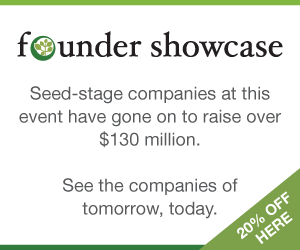Good Tuesday morning, everyone!
—–
Top News in the A.M.
Internet companies can be made to remove irrelevant or excessive personal information from search engine results, Europe’s top court ruled earlier today in a case pitting privacy campaigners against Google.
—–
Ed Tech Startups are Hot: Now, How to Make Money
There’s no question that when it comes to ed tech, the market is about as hot as it gets. According to CB Insights, roughly $600 million was invested in 103 related deals in the first quarter of this year. Compare that to all of 2013, when investors plugged $1.25 billion into ed tech startups, and you start to sense just how brisk the pace of investing has been.
Some questions now are where to pour more dollars, as well as how investors will wring venture returns out of the startups they’ve already backed. Wright Steenrod, a partner at Chrysalis Ventures, has a few answers, based on his 10 years of experience in ed tech investing. We chatted by phone yesterday.
Your firm has sold several ed tech companies, and you’re currently on the boards of three others. What do you think education will look like in 20 years?
I think there will be a public K-12 system and that we’ll still have four-year colleges where people go to school and live in dorms. In North America, which has brand value in post secondary leadership, [education] will still be delivered through the institutions that it’s delivered through now. But international [education] is a completely different story. Because the developing world has fewer robust institutions, it’s much more of a green field opportunity.
There are so many ways to fund education-related startups right now. What are you looking for specifically?
We think there’s opportunity within K-12 and secondary education. When you look at the budget situation in this country, it’s hard to argue that schools will receive more money to spend; instead, they have to create greater value with lesser dollars, much like healthcare. So tech and services that help schools deliver better value at less cost is an area of interest.
What kinds of tech and services?
I think overall, standardized tests will see a lot of innovation. Even more interesting to me are cognitive science tests that tell you quite a bit about how somebody thinks or behaves. These types of tests have been sitting around in desk drawers because you didn’t have the Internet to distribute them, and you didn’t have an artificial intelligence engine to grade them, but [now that we do], I think you’ll see more.
What’s overfunded?
From an early-stage investor’s point of view, it’s difficult to try and figure out which content and curriculum will succeed. It’s being sourced all over the globe. There are talented people everywhere who’ve developed online ways of helping 4- to 6-year-olds learn how to read, and created math programs for 7-years-olds. But is the literacy program developed in Australia — versus Singapore versus California — better? I think it’s very hard to determine from an investors’ perspective, yet a lot of money is going into [related startups].
It’s hard to see how many of these companies exit. Who are the acquirers here for companies that don’t go public?
There are a number of non-traditional buyers that are interested in education. Google’s deal with Renaissance Learning comes to mind. I think private equity firms or new strategics will be buyers, including because you can build stable cash-flow businesses around education. Traditional institutions like Pearson will be buyers as well, though with all the money coming into the space, they aren’t going to buy enough to allow many investors to find a successful exit.
We should all be excited as citizens for what tech is doing for education. But I do think how you make money off those innovations remains the biggest challenge for investors.

New Fundings
Addepar, a 4.5-year-old, Mountain View, Ca.-based cloud-based platform that’s used by wealth and fund managers to connect users’ financial data in a single repository, has raised $50 million in a round of financing led by Yammer founder David Sacks and the venture firm Valor Equity Partners. The company has raised $65.8 million altogether, including from AccelerateIT Ventures and ff Venture Capital.
Adform, a 12-year-old, Copenhagen-based ad tech company, has raised $5.5 million in Series B funding led by the Nordic firm Via Venture Partners, which had also provided Adform with an undisclosed amount of funding in 2010.
Anaplan, a 7.5-year-old, San Francisco-based company that makes business planning software, has raised $100 million in Series D funding led by DFJ. Other investors in the round include Brookside Capital,Coatue Management, Sands Capital Management, and Salesforce, along with earlier investors Granite Ventures, Meritech Capital Partners and Shasta Ventures. Anaplan has raised $150 million altogether. The WSJ has more on the giant round here.
Aquion Energy, a 5.5-year-old, Pittsburgh, Pa.-based company that makes sodium ion batteries and energy storage systems, has secured $20 million in venture debt from Trinity Capital Investment and CapX Partners. The company has separately raised about $94 million in equity, according to Crunchbase. Some of its backers include Kleiner Perkins Caufield & Byers, Foundation Capital, Advanced Technology Ventures, Bright Capital, Bill Gates, and Gentry Venture Partners.
Auxmoney, a 6.5-year-old, Düsseldorf, Germany-based peer-to-peer marketplace for lending money, has raised a $16 million Series B round led by Foundation Capital. Partech Ventures and Scott Bommer, founder of the hedge fund SAB Capital, also participated in the funding, as did earlier investors Index Ventures and Union Square Ventures. Auxmoney has raised $29 million to date, reports TechCrunch.
BlazeMeter, a 2.5-year-old, New York-based company that has created a self-service, cloud-based performance testing platform for enterprises, has raised $6.5 million in Series A funding led by earlier investor YL Ventures. Glilot Capital Partners and Western Technology Investment also participated in the round, reports TechCrunch. The company has raised $7.7 million to date.
BuildingIQ, a 4.5-year-old, Foster City, Ca.-based maker of energy-management software, is looking to raise a new round of financing on a par with a $9 million round the company closed in early 2013, reports Bloomberg. BuildingIQ’s current backers include Aster Capital, Paladin Capital Group, and Siemens Venture Capital. It has raised $20.7 to date.
ChargePoint, a 6.5-year-old, Campbell, Ca.-based electric vehicle charging network, has raised $22.6 million in new funding from existing investors Rho Ventures, Kleiner Perkins Caufield & Byers, Braemar Energy Ventures, Siemens Venture Capital, Voyager Capital and BMW. It has now raised a total of $110 million in funding.
Chase Pharmaceuticals, a 6.6-year-old, Washington, D.C.-based company that’s focused on the clinical development of treatments for central nervous system diseases, has raised $21 million in Series B funding led by New Rhein Healthcare Investors. Other new investors include Edmond de Rothschild Investment Partners and Cipla Ventures. The company has raised $22.2 million to date, shows Crunchbase.
Colabo, a 3.5-year-old, San Carlos, Ca.-based software company whose platform helps sales and marketing professionals with lead generation, has raised $1.5 million in funding from the Hive, a firm that incubates and funds data-focused startups. Other participants in the round included Pivotal CEO (and former VMWare CEO) Paul Maritz, and Ray Rothrock, who spent 25 years as a venture capitalist with Venrock.
Instart Logic, a 3.5-year-old, Mountain View, Ca.-based company that makes application delivery software aimed at improving Web and mobile app performance, has raised $26 million from Kleiner Perkins Caufield & Byers, Andreessen Horowitz, Greylock Partners, Sutter Hill Ventures and Tenaya Capital. The company has raised $52 million to date.
iYogi, a 6.5-year-old, Gurgaon-based company that sells online, subscription-based technical support services across a wide range of computing and communications devices, has raised $28 million in Series E funding from Axon Partners Group, Madison India Capital, and a group of other unnamed investors, reports VCCircle. The company has raised $86.5 million to date, according to Crunchbase.
Lysosomal Therapeutics, a new, Cambridge, Ma.-based company focused on discovering new drugs for neurodegenerative diseases, has raised $4.8 million in seed funding led by Atlas Venture. Other participants in the round included Hatteras Venture Partners, Lilly Ventures, Sanofi-Genzyme BioVentures, Roche Venture Fund,Partners Innovation Fund, Orion Equity Partners, and several angel investors.
Mobius Motors, a three-year-old, Kenya-based car-manufacturing company that plans to build Africa’s cheapest car, has raised an undisclosed amount of funding from Pan African Investment Co., the two-year-old investment firm of billionaire Ronald Lauder and former TimeWarner CEO Dick Parsons. Forbes has more here.
SalesPredict, a two-year-old, San Francisco-based SaaS startup focused on helping its clients increase revenues using predictive analytics, has raised $4.1 million in Series A funding from Yandex, KGC Capital and existing investors. The company has raised 5.3 million to date.
Shareablee, a 1.5-year-old, New York-based social media analytics startup, has raised $6 million in Series A funding led by SoftBank Capital. Earlier investor Valhalla Partners also participated in the round, which brings the company’s total funding to $6.76 million.
Swagbucks, a 5.5-year-old, El Segundo, Ca.-based rewards site that competes with RetailMeNot and others, has raised a $60 million round of funding from Technology Crossover Ventures. It is the first round of outside funding for the company, which has been profitable since 2010, reports TechCrunch.
—–
New Funds
Norwest Venture Partners has closed its 12th fund, Norwest Venture Partners XII LP, at $1.2 billion, which is the same size as its last fund, closed in 2009. Wells Fargo remains the outfit’s sole backer. The WSJ’s Deborah Gage has much more here.
—–
IPOs
Zendesk, the on-demand customer service platform provider, is expected to go public on Thursday in an IPO that could prove important to Box‘s postponed initial offering. Silicon Valley Business Journal elaborates here.
—–
Exits
HealthPost, a three-year-old, Houston-based physician referral and appointment scheduling startup, has been acquired for “around $25 million” by The Advisory Board Company, a Washington, D.C.-based research, technology, and consulting firm. MedCity News has more here. HealthPost had raised an undisclosed amount of money from Next Wave Health.
Lumena Pharmaceuticals, a three-year-old, San Diego-based biopharmaceutical company focused on rare cholestatic liver diseases and serious metabolic disorders, has been acquired for $260 million by Shire, a Dublin-based specialty pharmaceuticals company that trades on the London Stock Exchange. Lumena had raised roughly $70 million from investors, including Alta Partners, New Enterprise Associates,RA Capital Management, Adage Capital Management, RiverVest, and Pappas Ventures and had filed to go public last month. Xconomy has more here.
NanoH2O, a nine-year-old, L.A.-based maker of reverse osmosis membranes for seawater desalination, has been acquired by Seoul-based LG Chem Ltd. for $200 million. The company had raised at least $95.5 million, shows Crunchbase, including from Khosla Ventures, Oak Investment Partners, BASF Venture Capital GmbH, Total Energy Ventures International and the China-focused fund Keytone Ventures. Bloomberg has more here.
VersaPharm, a 19-year-old, Marietta, Ga.-based developer and marketer of generic pharmaceuticals and topical treatments, has been acquired by the publicly traded specialty drugmaker Akorn for $440 million. The acquisition price wasn’t disclosed. The Atlanta Business Chronicle has more here.
Wilocity, a 6.5-year-old, Caesarea, Israel-based mobile device chip maker, is in advanced talks to be acquired by the mobile phone chip maker Qualcomm, for “some $300 million,” reports Haaretz. The piece adds that the “two sides have yet to agree terms on all the provisions of the sale.” Wilocity has raised at least $55 million from investors, including Benchmark, Sequoia Capital, Jerusalem Global Ventures, and Tallwood Venture Capital.
—–
People
Fast Company has just published its list of the “100 Most Creative People in Business” edition and it’s studded with tech operators. Among them: Tim Kendall of Pinterest, Naval Ravikant of AngelList, and Mariam Naficy of Minted.
In 2010, Facebook CEO Mark Zuckerberg donated $100 million to the Newark public school system. Four years later, the funds have had astonishingly little impact, reports the New Yorker.
—–
Job Listings
Trulia, the residential real-estate site and service that went public in the fall of 2012, is looking for a VP of business development. The job is in San Francisco.
—–
Happenings
The VentureScape conference kicks off in San Francisco today. Here is the agenda, if you’re thinking about swinging by. (StrictlyVC hopes to be there for a bit.)
Wired’s BizCon conference also kicks off today. Here are some details about the event, taking place in New York City.
—–
Data
The research firm 451 Research has surveyed its audience a handful of times since the spring of 2012 of it says respondents have never been so bullish on M&A as now, with 72 percent expressing plans to step up their M&A activity through the end of 2014. More here.
Health-software startups raised $237.5 million in the first quarter of this year, the most raised in any single quarter since 2000, according to Dow Jones VentureSource.
—–
Essential Reads
Square Wallet had everything going for it. And now it’s dead.
Launching a business is easier than it’s ever been, but the lives of new companies are often brutish and short, reports James Surowiecki.
—–
Detours
An around-the-world selfie.
Mom computer therapy.
—–
Retail Therapy
The Wiki Booth.
Calamityware!
—–
To sign up for StrictlyVC, click here. To advertise, click here.
 In late October, Nirav Tolia had reason to celebrate. The CEO of Nextdoor, a four-year-old, San Francisco-based social network for neighbors, had just raised $60 million in a financing led by Kleiner Perkins Caufield & Byers and Tiger Global Management — a round that brought the company’s funding to roughly $100 million.
In late October, Nirav Tolia had reason to celebrate. The CEO of Nextdoor, a four-year-old, San Francisco-based social network for neighbors, had just raised $60 million in a financing led by Kleiner Perkins Caufield & Byers and Tiger Global Management — a round that brought the company’s funding to roughly $100 million.





